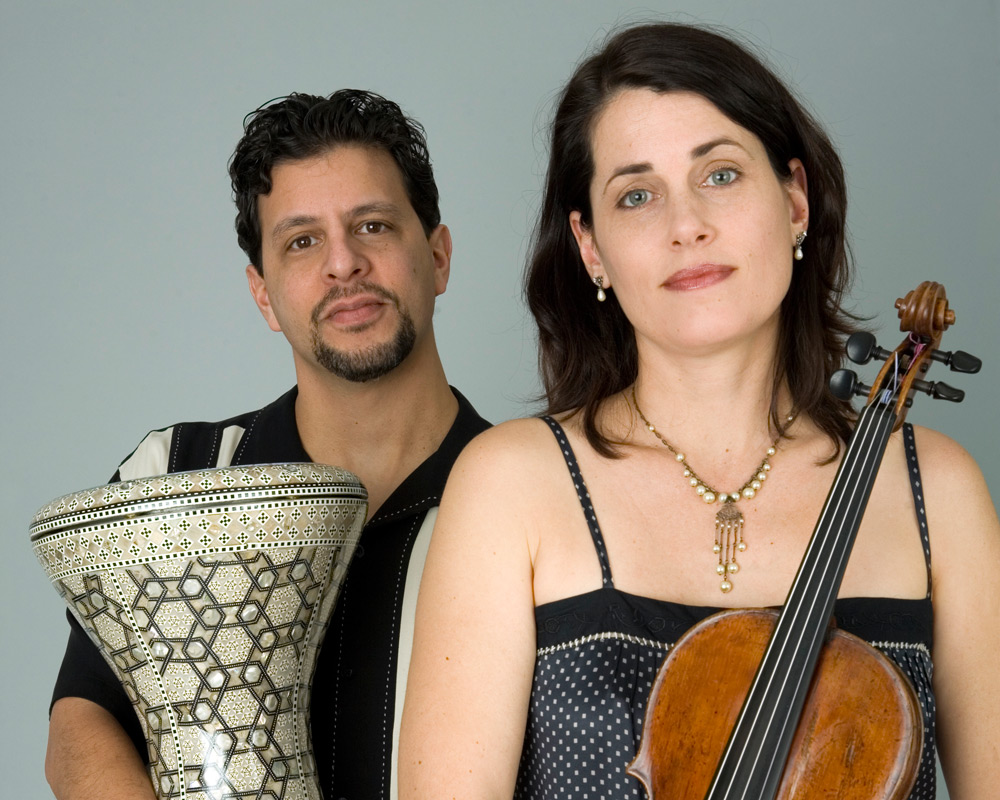The day the two members of duoJalal met in 1998 marked a convergence of musical worlds. Violist Kathryn Lockwood had launched a career in chamber music, while Yousif Sheronick excelled in a gamut-spanning array of percussive traditions, from Brazilian folk to rock ‘n’ roll. But it wasn’t until years later, long after they had fallen in love and gotten married, that the pair began to collaborate.
“Someone offered to write us a piece of music. And we just sort of—we thought, ‘Oh, isn’t that cute,’” Lockwood says, laughing at the memory. “And then we played together and we were like, ‘This is really fun, let’s do this more.’”
In a sense, duoJalal—which will perform at Killian Hall in Cambridge on February 23 as part of MIT’s Sounding Series—reflects the increasingly blurring boundary between classical and global music. “We used to joke that we would never play together, and little by little those worlds started colliding,” Sheronick says. “And now you see a lot of classical composers wanting to use those [other] influences.”
duoJalal’s music, which consists of both commissioned compositions and existing pieces adapted for viola and percussion, lives in the intricate interplay of melody and rhythm. “I think there’s this conception that Kathryn’s going to play the melody and I’m just going to accompany her,” Sheronick says. In reality it’s much more of a dance, a fluid intermingling of propulsion and expression.
duoJalal owes its uniqueness in large part to Sheronick’s wide-ranging abilities on a variety of instruments, from the vibraphone to the Egyptian riq. But the frame drum is his specialty. “You find frame drums in every culture around the world because they’re the simplest drum you can find. All you need is a hoop and a drumhead,” he explains. Sheronick subscribes to no orthodoxy–he draws on techniques from a number of hand drumming traditions–and the results are transportive. Here he evokes the harsh thrum of a moth’s wings against a screen door; there the metallic plunk of raindrops on a gutter; now the deep thump of the heart in its chest.
duoJalal takes its name from the 13th century Persian poet Jalāl ad-Dīn Muhammad Rūmī. Sheronick, never much of a poetry fan, describes a special connection to Rumi’s work. “What I found is that, if I was in a funky mood, I would read a little bit of Rumi poetry and it would make me feel better,” he says. “I felt more part of life and part of a community. This is what his poetry seems to do. And what we love about it is it bridges cultures and religions, and it’s not specifically Christian or Muslim or Jewish. It speaks to everyone.”
duoJalal’s 2016 album, “Shadow & Light: The Rumi Experience,” contains two multi-part commissions inspired by Rumi’s poems: “Shadow and Light” by the Russian-born composer Lev Zhurbin, and “Honey from Alast,” by MIT Kenan Sahin Distinguished Professor (and Sounding Series curator) Evan Ziporyn. The album also features adaptations of pieces by Giovanni Sollima, Shirish Korde, Somei Satoh and Zhao Ji-Ping. But the Zhurbin and Ziporyn compositions form the core of the project. “Honey from Alast” flickers with barely restrained fire, leaping from hushed portent to minor-key tumult. The four-part “Shadow and Light” is a slower burn, by turns yearning and meditative.
Both pieces allow Lockwood to shine. At times virtuosic, she is a textural chameleon as well, possessed of a pliant, expressive timbre. “The viola has that tone of the human voice, and I can always picture a really beautiful singer singing when she plays,” Sheronick says. “She’s definitely a great technical player, but not a lot of people have that warm quality to their tone and can add as much emotion to their playing.”
But the crux of duoJalal is, of course, its duality–the dynamic relationship between viola and percussion, in which conflict is as crucial as amity. Lockwood’s training imbued her with a loose, pliable sense of time, Sheronick’s with a deep connection to groove. Sometimes, they find themselves at odds. But that negotiation across difference–genre to genre, culture to culture, person to person–is the source of duoJalal’s strength.
“Over time, we’ve learned how to give and take,” Lockwood says. “So now I feel, with body language and communication, if I want to take some time here or there, he’s right there with me.”
PUBLIC PERFORMANCE
The Rumi Experience
Thursday, February 23, 2017 / 8:00pm
MIT Killian Hall, 14W-111
160 Memorial Drive, Cambridge, MA
Free and open to the public
No registration necessary

